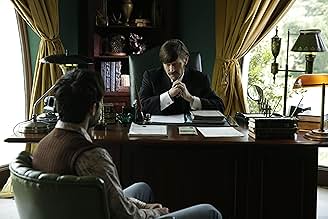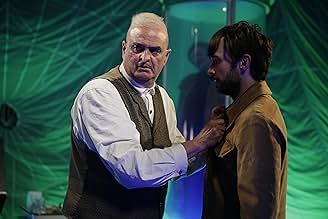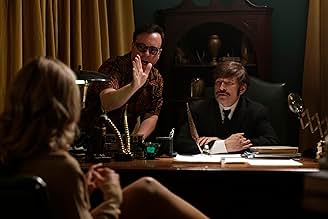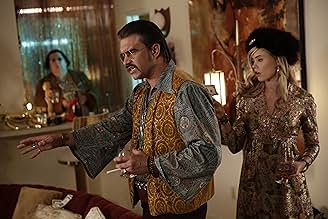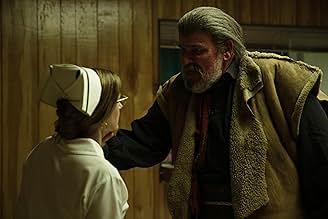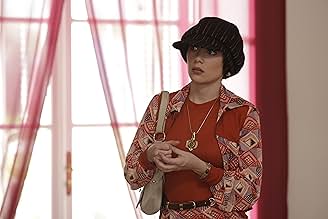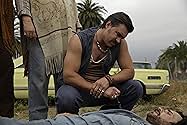A Blind Bargain
- 2025
- 1h 35m
YOUR RATING
Set in 1970, A BLIND BARGAIN reimagines the lost 1922 Lon Chaney silent film of the same name. A desperate young man strikes a dark deal with an unhinged doctor, offering his mother as a sub... Read allSet in 1970, A BLIND BARGAIN reimagines the lost 1922 Lon Chaney silent film of the same name. A desperate young man strikes a dark deal with an unhinged doctor, offering his mother as a subject for the physician's twisted experiments.Set in 1970, A BLIND BARGAIN reimagines the lost 1922 Lon Chaney silent film of the same name. A desperate young man strikes a dark deal with an unhinged doctor, offering his mother as a subject for the physician's twisted experiments.
- Director
- Writers
- Stars
- Director
- Writers
- All cast & crew
- Production, box office & more at IMDbPro
Featured reviews
BLIND BARGAIN (2025) took me by surprise, in the best possible way. The story blends genuinely interesting characters and off-beat situations with touches of fantasy in exactly the right doses. It concerns a mysterious physician's unconventional attempts at reversing the aging process, and how an unassuming young man gets his mother get caught up in the experiment. As with other films from director Paul Bunnell, you can never predict where the next scene will take you. It is by turns weird when weird is called for, and unsettling when necessary, but always intriguing - a morality fable wrapped in a waking dream. Not only does BLIND BARGAIN hold the viewer's attention, it benefits from repeat screenings, even after you know where things are headed, because these wonderfully realized characters are more important than the secrets they keep.
The cast is ideally suited for this story and the strange world in which it takes place. Crispin Glover as Dr. Gruder is letter perfect in a role that is serious and sometimes menacing, but never played for laughs. Lucy Loken walks a fine line as Ellie Bannister, the doctor's beguiling assistant, not immediately identifiable as one of the good guys or one of the bad. The positively charming Amy Wright is warm and relatable as the long-suffering mother, Joy Fontaine, while Jake Horowitz is her son Dominic, who is suffering from post-war drug addiction. Horowitz's performance is convincing and grounded in reality, making Dom deeply flawed yet sympathetic. You can't help but root for him, even as you wince at some of the choices he makes. Annalisa Cochrane appears later in the movie, playing a pivotal role with grace and an almost otherworldly presence. All of the leads portray their characters seriously without any winks to the camera, lending gravity to the events unfolding. Other actors, including Rob Mayes, Jed Rowen and Sean Whalen, get to add a lighter touch for occasional moments of humor, which helps balance things out.
Set in 1970, BLIND BARGAIN is a stylized time capsule, from the locations to the vehicles, the set dressing, and - of course - the wardrobe. Top marks to everyone in charge of props and set dressing, for their nostalgia inducing contributions! Visually, the movie succeeds in looking exactly like something released in that era, infused with a pleasing grain that lends depth to the image, but doesn't overwhelm. Director of photography Francisco Bulgarelli incorporates some old school techniques, including rear screen projection work, scene swipes and cutaways, and even a split screen at one point. It's all sparingly employed, though, so as not to become gimmicky. There are also a couple of trippy, colorful sequences depicting the mind state of characters under the influence of hallucinogens. Once again, these side trips illustrate a point and are pleasing breaks from the norm, but they are never over indulged.
Like the photography, I cannot say enough good things about the score. The original underscore and main theme are by Ego Plum, who really fired up the creativity engine to produce evocative, memorable music appropriate to the proceedings. I was hooked instantly, thanks to a suspenseful, driving piece that plays throughout the opening scene and continues right into the main titles. It established the mood very nicely. Backward tracks are incorporated here and there, which subtly mirror the concept of turning back time. Even more satisfying is a sweet, melancholy ballad (!), sung during a party sequence. This song sneaks up on you out of nowhere and then stays with you, part of a haunting, surreal scene that is over all too quickly. I was utterly mesmerized watching this the first time, caught up in the dreamlike performance as if I were right there experiencing it in person. And on a second watch, I realized the same melody had been briefly, quietly introduced much earlier (but I won't spoil where!). Music by other artists is used in a few spots very effectively, but Bunnell resisted any urge to pepper this project with well-known pop tunes from start to finish, which probably would have been the obvious move for a lot of directors.
I mentioned the dreamlike qualities of the movie, and that really does describe BLIND BARGAIN overall, to its credit. It's sometimes sad, sometimes wistful, other times nightmarish, but always plays out like the fantasy you experience deep in slumber, which you cannot resist. From the very first scene, I wanted to know what was going to happen next. When the movie ended, I couldn't wait to watch it again! Now that I had a handle on the relationships of the characters, their predicaments became more - not less - interesting to me. At one point, we are introduced to The Scrivner, someone with a hinted at supernatural presence. On my first watch I assumed this was an interesting but not entirely necessary diversion. But on my second viewing, I understood that what transpires during that scene - an exchange of artifacts - wasn't what was important. The Scrivner takes that opportunity to gently impart words of wisdom about aging and living that speak to the heart of the story, and which I have a profound appreciation for. I was not expecting to be philosophically challenged at any point during the movie, yet I now think about his simple, direct monologue often.
A lot of talent has come together on and off screen to bring BLIND BARGAIN to life. Paul Bunnell has a knack for selecting exactly the right people in the right capacity, and here he has assembled a brilliant combination for a most unusual and entertaining piece of storytelling. This love letter to the filmmaking of yesteryear also acts as a respectful nod to classic mystery/fantasy anthologies such as THE TWILIGHT ZONE and especially THE NIGHT GALLERY. You'll know what I mean when you see it. BLIND BARGAIN is not a cookie-cutter, by-the-numbers studio feature, but it IS a fine contribution to the world of cinema, and it actually has something to say. "Go on living."
The cast is ideally suited for this story and the strange world in which it takes place. Crispin Glover as Dr. Gruder is letter perfect in a role that is serious and sometimes menacing, but never played for laughs. Lucy Loken walks a fine line as Ellie Bannister, the doctor's beguiling assistant, not immediately identifiable as one of the good guys or one of the bad. The positively charming Amy Wright is warm and relatable as the long-suffering mother, Joy Fontaine, while Jake Horowitz is her son Dominic, who is suffering from post-war drug addiction. Horowitz's performance is convincing and grounded in reality, making Dom deeply flawed yet sympathetic. You can't help but root for him, even as you wince at some of the choices he makes. Annalisa Cochrane appears later in the movie, playing a pivotal role with grace and an almost otherworldly presence. All of the leads portray their characters seriously without any winks to the camera, lending gravity to the events unfolding. Other actors, including Rob Mayes, Jed Rowen and Sean Whalen, get to add a lighter touch for occasional moments of humor, which helps balance things out.
Set in 1970, BLIND BARGAIN is a stylized time capsule, from the locations to the vehicles, the set dressing, and - of course - the wardrobe. Top marks to everyone in charge of props and set dressing, for their nostalgia inducing contributions! Visually, the movie succeeds in looking exactly like something released in that era, infused with a pleasing grain that lends depth to the image, but doesn't overwhelm. Director of photography Francisco Bulgarelli incorporates some old school techniques, including rear screen projection work, scene swipes and cutaways, and even a split screen at one point. It's all sparingly employed, though, so as not to become gimmicky. There are also a couple of trippy, colorful sequences depicting the mind state of characters under the influence of hallucinogens. Once again, these side trips illustrate a point and are pleasing breaks from the norm, but they are never over indulged.
Like the photography, I cannot say enough good things about the score. The original underscore and main theme are by Ego Plum, who really fired up the creativity engine to produce evocative, memorable music appropriate to the proceedings. I was hooked instantly, thanks to a suspenseful, driving piece that plays throughout the opening scene and continues right into the main titles. It established the mood very nicely. Backward tracks are incorporated here and there, which subtly mirror the concept of turning back time. Even more satisfying is a sweet, melancholy ballad (!), sung during a party sequence. This song sneaks up on you out of nowhere and then stays with you, part of a haunting, surreal scene that is over all too quickly. I was utterly mesmerized watching this the first time, caught up in the dreamlike performance as if I were right there experiencing it in person. And on a second watch, I realized the same melody had been briefly, quietly introduced much earlier (but I won't spoil where!). Music by other artists is used in a few spots very effectively, but Bunnell resisted any urge to pepper this project with well-known pop tunes from start to finish, which probably would have been the obvious move for a lot of directors.
I mentioned the dreamlike qualities of the movie, and that really does describe BLIND BARGAIN overall, to its credit. It's sometimes sad, sometimes wistful, other times nightmarish, but always plays out like the fantasy you experience deep in slumber, which you cannot resist. From the very first scene, I wanted to know what was going to happen next. When the movie ended, I couldn't wait to watch it again! Now that I had a handle on the relationships of the characters, their predicaments became more - not less - interesting to me. At one point, we are introduced to The Scrivner, someone with a hinted at supernatural presence. On my first watch I assumed this was an interesting but not entirely necessary diversion. But on my second viewing, I understood that what transpires during that scene - an exchange of artifacts - wasn't what was important. The Scrivner takes that opportunity to gently impart words of wisdom about aging and living that speak to the heart of the story, and which I have a profound appreciation for. I was not expecting to be philosophically challenged at any point during the movie, yet I now think about his simple, direct monologue often.
A lot of talent has come together on and off screen to bring BLIND BARGAIN to life. Paul Bunnell has a knack for selecting exactly the right people in the right capacity, and here he has assembled a brilliant combination for a most unusual and entertaining piece of storytelling. This love letter to the filmmaking of yesteryear also acts as a respectful nod to classic mystery/fantasy anthologies such as THE TWILIGHT ZONE and especially THE NIGHT GALLERY. You'll know what I mean when you see it. BLIND BARGAIN is not a cookie-cutter, by-the-numbers studio feature, but it IS a fine contribution to the world of cinema, and it actually has something to say. "Go on living."
Did you know
- Crazy creditsEnd Credits: "Any unauthorized duplication, copying, distribution, exhibition or use may result in civil liability, and/or criminal prosecution and the wrath of Logos."
- ConnectionsRemake of Rival des Dieux (1922)
- SoundtracksThose Were The Days
Written by Gene Raskin and Boris Fomin
Performed by Mary Hopkin
Courtesy of TRO Essex Music, Inc.
By arrangement with Mary Hopkin Music
Details
- Release date
- Country of origin
- Official sites
- Language
- Filming locations
- Production company
- See more company credits at IMDbPro
Box office
- Budget
- $2,500,000 (estimated)
- Runtime
- 1h 35m(95 min)
- Color
- Aspect ratio
- 1.66 : 1
Contribute to this page
Suggest an edit or add missing content

